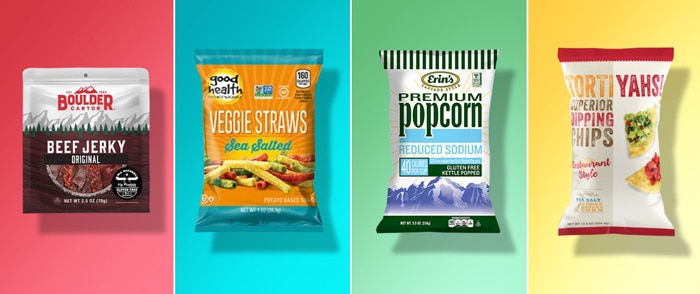With Deal, Utz Hopes to Become Snacking Platform
 After weeks of speculation, Utz Quality Foods LLC announced this morning a new partnership with Collier Creek Holdings to combine and go public as a snack food platform under the name Utz Brands. The transaction is expected to close in the third quarter of 2020.
After weeks of speculation, Utz Quality Foods LLC announced this morning a new partnership with Collier Creek Holdings to combine and go public as a snack food platform under the name Utz Brands. The transaction is expected to close in the third quarter of 2020.
Founded in 1921, Utz is the largest family-owned, privately-held salty snack company in the U.S. In a presentation this morning, Collier Creek noted that Utz has had more than 43 years of consecutive adjusted net sales growth. The fourth largest salty snack company nationally, and second in its core geographies, Utz’s 2020 net sales are estimated to be roughly $910 million. The company currently sells over 5 million pounds of snacks per week, across over 107,000 retail doors.
Once listed on the New York Stock Exchange, Utz is expected to have an initial value of $1.56 billion. The Rice and Lissette family, the founding family and current owners of UTZ, will retain roughly 90% of their existing equity, which accounts for just over 50% ownership of the new company. Moving forward, Dylan Lissette, the CEO of Utz Quality Foods since 2012, will serve as CEO of Utz Brands.
Collier Creek was founded in 2018 by Roger Deromedi, a former CEO of Kraft Foods and Chairman of Pinnacle Foods, alongside Jason Giordano and Chinh Chu, two former managing directors at private equity firm Blackstone and current managing directors at CC Capital. The pair raised $475 million to form Collier Creek Holdings as a special purpose acquisition company tasked with establishing a new CPG platform.
In a presentation today, Chu said their objective was to find “Pinnacle 2.0,: which he described as “an attractive platform asset well suited for value creation strategies” through accelerating topline growth, improving margins and making strategic acquisitions. Utz was appealing because of its portfolio of iconic brands, manufacturing capabilities and distribution network, which largely relies on a direct store distribution (DSD) model which services 70% of all accounts..
The similarities between Utz and Pinnacle — which was acquired by Blackstone in 2007, went public in 2013 and finally sold to Conagra in 2018 — were explored throughout the investor presentation today. Under Blackstone and Deromedi’s leadership, Pinnacle’s net sales doubled and EBITA tripled.
“Pinnacle raised eight times its money and we believe that Utz is a better company then Pinnacle when we first got started and has more opportunities,” Chu said.
For example, Utz currently spends less on marketing and has a lower cost of goods (COG’s) then Pinnacle did in 2007. Giordano added that while Pinnacle was focused on declining categories, salty snacks are on the rise and expected to see even more growth.
Entering the $26 billion U.S. salty snacks segment was also appealing for both having consistent pricing and less penetration by private label brands, Chu added. But given the currently rocky economic climate, executives from Collier Creek said, the category’s historic resistance to economic downturn was also attractive. From 2008 through 2010, Utz grew sales from $359 million to $403 million. Additionally, during the Covid pandemic, Utz CFO Cary Devore said, consumers seem to be looking to larger brands as a source of comfort and familiarity.
“In a world of volatility. In a world plagued by Covid, Utz has done very very well,” Chu said. “It is resilient to economic downturn and has benefitted from the current climate.”
Although many of Utz’s brands lean towards conventional shoppers, the company has acquired several better-for-you brands including Snikiddy in 2015, Good Health in 2014 and Boulder Canyon in 2017. The latter two have performed well at retail, with Good Health’s sales growing from $13 million to $48 million over the last five years.
To achieve its goal of becoming the fastest growing pure-play branded snack platform of scale in the U.S,” Utz is planning a variety of operational, marketing and distribution upgrades, including optimizing the company’s plants, launching new trade software and refining pricing. The company is also seeking to adjust its margin mix by growing higher-margin “power brands,”which account for 71% of the company’s sales, and “de-emphasizing” lower margin and private label products, which represent only 10% of sales.
Closing the gap with competitors such as PepsiCo, Campbell’s, Kellogg’s, General Mills and Hershey’s in certain channels will also be a focus. Utz holds 3.2% share in convenience stores and 2.4% in mass. The company will look to launch new innovative products, either through internal development or acquisition, in adjacent categories such as tortilla chips, ready-to-eat popcorn, bagel/cracker snacks and baked snacks. Lisette said that the company will look to acquire “small tuck-ins” as well as “larger, transformative” opportunities from brands that can either expand Utz’ geographic reach or its move into subcategories.
“We truly feel we found an ideal asset for our playbook, and very importantly, a team that shares our long term vision of value creation and continued stewardship of this tremendous business,” Chu said “We’re very confident in the team’s ability to deliver, just like Pinnacle, and could not be prouder of this transaction.”
















